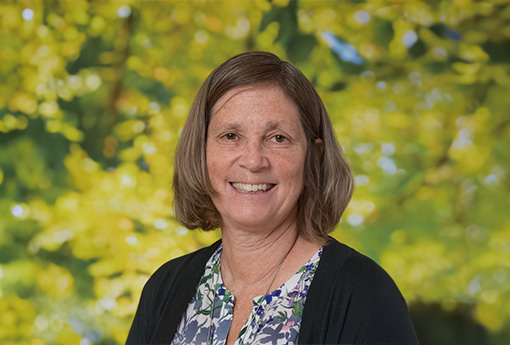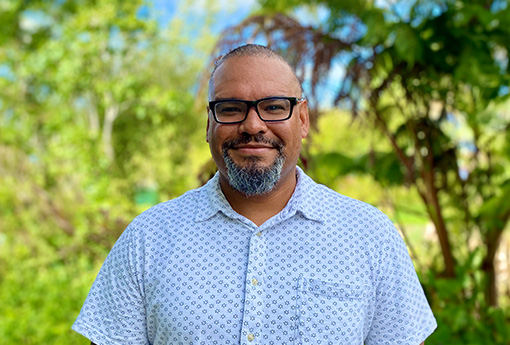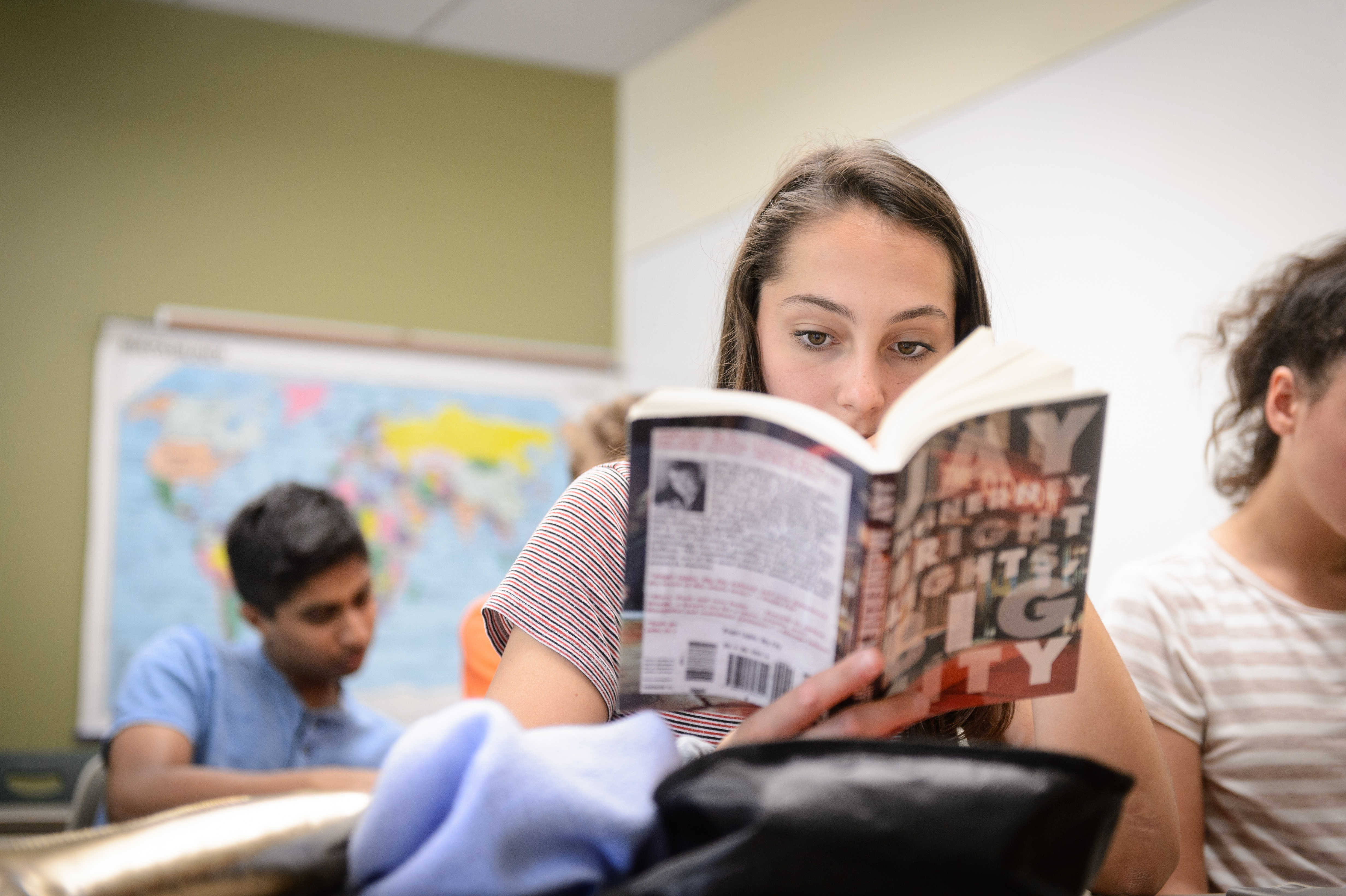
Upper School Curriculum & Coursebook
Our program is academically rigorous, artistically rich, and athletically competitive.
Explore our Comprehensive Coursebook to Learn More
Upper School Coursebook
Requirements For Graduation
Students are required to be enrolled in five major courses each semester. Any exception to this requirement must be approved by the Head of Upper School. The School recognizes and supports accommodations for students with documented learning disabilities.
School policy requires that a Senior must pass all courses in which enrolled during the Senior year, regardless of any prior fulfillment of the distribution requirements or other factors. Seniors who have failed a one-semester or a year course will be granted a certificate of attendance in June and be given the opportunity to earn the diploma within a specified time subsequent to June of the Senior year.
Academic Support
The Upper School Academic Support Department provides services for students with documented learning disabilities, as well as general academic help for any student in the Upper School who wants to improve. Students with learning differences work with Academic Support, in conjunction with the Upper School faculty and the Health Center, to arrange for necessary accommodations.
Individual consultation is available to assist students with their specific learning needs. The goal of Academic Support is to help students become independent learners and self-advocates. General academic assistance for students is available by referral from teachers, advisors, parents, or self-referral. Students schedule an appointment to discuss their concerns, which can range from learning more effective study strategies to the need for a more extensive educational evaluation. Study skills assistance is provided in the areas of time management, organization, note-taking, reading comprehension, test preparation, and test-taking.
Arts
The study of art affects many areas of learning. The development of perceptual skills, like that of verbal skills, is vitally important because these skills improve thinking. The study of art, while enhancing learning as a whole, also has value as a discipline in and of itself.
The Upper School Art curriculum encourages students to be open and receptive to new ideas, to new ways of working and thinking and taking risks. Students learn to value experimentation and discovery without fear of right or wrong outcomes; the process of art-making is valued before product. Program goals broaden student awareness through involvement in the art-making process and aim to help students value themselves, their work, and the efforts of others.
Requirements: Because Wheeler considers art to be an integral part of the educational process, each student is required to take two art courses in the Upper School. The first of these, in the 9th or 10th grade, is always the Foundation Art course. Students new to Wheeler in the 10th grade are required to take Foundation Art. Students may then complete their art requirement by taking Introduction to Wheel Throwing, Digital Photography 1, Drawing, Graphic Design, Ceramics: Hand Building, Printmaking, or Painting before they graduate. Students new to Wheeler in the 11th grade are required to take either Foundation Art or one art elective, depending on previous art experiences.
Students with a strong interest and ability in art should take Foundation Art in the ninth grade, and then complete the necessary application process to be considered for acceptance in the Studio Art program.
Students with a strong interest in art specialties can pursue advanced work in the Drawing, Ceramics, and/or Digital Photography sequence of courses. Serious students in the electives track may qualify for the Advanced Art Seminar.
English
The English department encourages students to become sophisticated readers and confident writers. Through an in-depth analysis of texts of increasing complexity chosen from various literary forms (autobiographies, essays, novels, short stories, plays, and poetry), our students develop their ability to understand and to explain an author’s style, voice, background and historical period. We strive for a balance between classic and contemporary texts and look to expose our students to a diverse selection of perspectives and subjects.
Writing is at the heart of all levels of the English curriculum. The department emphasizes both analytical and creative writing assignments in order to enhance students’ understanding of literature and their own place in the world. Students at each grade level can expect to write a variety of expository and personal essays, poems, short stories, and one-act plays. Students hone their writing through a revision process that involves thorough teacher commentary, peer editing in class, and the use of appointed student Writing Mentors. We encourage students to showcase their work in student publications and various writing contests.
All students must complete four full years of English study.
History
The History Department trains students to understand the foundations of the contemporary world. By the time students graduate (when many of them have reached voting age), they should be able to make informed decisions about the people, issues, and events around them.
To that end, students develop the skills needed to become successful citizens in today’s rapidly changing world. Students learn to think critically by examining both primary and secondary sources, by weighing different sides of arguments, and by evaluating options and judging outcomes. Such critical thinking is encouraged through a variety of means: essays, tests, presentations, research projects, debates, role-plays, class discussions, and a variety of types of writing assignments. Critical writing is stressed throughout the curriculum.
History courses are structured to build skills over the four-year span of secondary school. The skills developed and the knowledge acquired in one year’s course is designed to prepare students for the next. Taking courses out of sequence, therefore, is discouraged.
Students are required to take three years of History that include Topics in World History, Modern World History, and United States History. The Department encourages students to take the fourth year of History through our seminar program.
Mathematics
The objective of the Mathematics department is to give students the tools and problem-solving skills to face the challenges of a variety of problems. We encourage students to work both individually and collectively in finding solutions. We want each student to build confidence in their ability to study mathematics now and in the future, to see connections among the concepts covered in our curriculum, and to reach their potential through understanding and appreciation of the subject.
Although students are required to take three years of math in Upper School, most students take mathematics courses in each of the four years. Graduation requirements include two years of passing grades in Algebra and one year in Geometry. Students who have a particularly strong interest in mathematics or in another field which relies on advanced mathematical ideas may, if qualified, undertake an accelerated sequence. A TI-Nspire CAS graphing calculator and computer software that comes with the calculator are required for all students in every course.
Modern Languages
To become proficient in modern language, students must learn to speak, to listen and understand, to read and to write in the target language. Teachers, therefore, choose activities to address these four skills. At each level, students learn grammar and vocabulary, study cultural units, read selected literary texts or news articles, watch video clips or films, write in journals or prepare more formal compositions, and converse in groups or speak in front of the class. Since we encourage students to become independent speakers, the higher-level courses place greater demands on a self-generated conversation. In each class, the mid-year examination is oral and requires the student to meet individually with the teacher to converse in the target language.*
Wheeler offers course work in Chinese, French, and Spanish. Students normally begin studying any one of these three languages in the sixth or ninth grades. Modern language students must earn a C- or better in level 1 language study to continue to level 2. Those students who earn a D+ or below must either repeat level 1 at Wheeler the following year or satisfactorily complete an approved summer school course and pass the department’s qualifying exam prior to continuing to level 2 at Wheeler. Students with accepted documentation of a language waiver can opt to take the language Pass/Fail.
Performing Arts
Courses in the Performing Arts curriculum involve students in a process, which includes creativity, sharing, performance, and critical analysis. Courses designated Ensemble develop fundamental skills while exploring history, form, and theory. Courses designated as Performance emphasize repertoire, technique, and hands-on applications. Performance courses require an audition to determine appropriate placement. Specific audition criteria are available from individual instructors.
Every student is required to complete successfully one full year of Performing Arts. This may be fulfilled with either major or minor elective courses. The department strongly recommends that every student complete at least one semester by the end of the sophomore year. Students new to Wheeler may enroll in any non-performance class or contact the department for entrance into a performance level course. Eleventh graders new to Wheeler need to take only one semester of Performing Arts.
Science
The Upper School science curriculum is based on the premise that all Wheeler graduates should be scientifically literate citizens, and that all of our students should be exposed to the methods and concepts of the primary physical and biological sciences. Each of our science courses emphasizes critical observation, logical reasoning, quantitative experimentation, problem-solving skills, and scientific literacy.
The minimum science requirement for graduation from Wheeler is three credits (three years of study), including Environmental Science, Chemistry, and a full-year course in either Biology or Physics. All students are encouraged to take at least one course in each of four scientific disciplines. After completing courses in Environmental Science (ninth grade) and Chemistry (tenth grade), students may take courses in Biology and Physics in either order. This sequence of courses is considered to be our core curriculum. Students new to Wheeler after the ninth grade are not required to take Environmental Science.
Athletics & Physical Education Program
Physical education and athletics are an integral part of the Upper School Program. Participation in either area encourages physical fitness, development of specific skills, cooperation and socialization with peers, and fun through physical activity. Athletics specifically develops values such as commitment, self-discipline, and teamwork. Participation in athletics is highly encouraged and fulfills the physical education requirement for a specific term. Physical education instruction and athletics participation are divided into three seasonal terms: Fall, Winter, and Spring. Requirements for the Athletic and Physical Education Program in the Upper School are as follows:
- All students must participate in a minimum of 100 minutes of physical education activities per week. This is a Rhode Island state requirement.
- Students must sign up for their elective activities at the beginning of each term
- Most physical education activities will meet after school one or two times per week depending on the activity. Weight Room participants may work out during the academic day.
- Playing on an interscholastic team fulfills the physical education requirement for that season.
- Student participation in the musical satisfies the Physical Education requirement for the winter trimester.
- Students will receive a grade of “credit” or “no credit” in physical education and athletics on the basis of attendance, knowledge, skill performance, improvement, and effort.
The only students exempt from the physical education requirement will be students doing documented, approved independent projects away from campus, and those with physical disabilities, who provide a physician’s letter of explanation to the School Nurse.
Community Service Learning
Community Service Learning (CSL) is an important part of the Upper School experience at Wheeler, and a requirement for graduation. The program is designed to broaden horizons, foster individual responsibility, and strengthen leadership skills through a commitment to service. As an Upper School student, you will learn the ethics of service, help meet critical community needs and realize that service is an opportunity to understand yourself and the world around you – a world enriched by a multitude of cultures, viewpoints, and lived experiences. Structured reflection within the program helps you assess the impact of service on an organization, the community it serves, and yourself. At the end of each year, Founder’s Day offers a chance for all Upper School students to share their service learning with others in the Wheeler community, working with Lower and Middle School students on service projects across the City of Providence.
Aerie Program Courses
Supplemental Course offerings individual needs and interests are often met with courses arranged through the Aerie Program. Seminars and tutorials with adjunct instructors can be arranged in consultation with advisors, department heads, and Aerie staff. 2018-‘19 courses included Astronomy, Neuroscience, Entrepreneurship, Linguistics, and Film Making.
Other Aerie courses offered in Upper School include:
- Broadcast Program Video Broadcasting
- Advanced Video Production
- Sound Production
- Radio Broadcasting
- Podcasting
- Supplemental Modern Language Offerings (in the past, American Sign Language, Ancient Greek, Urdu, French Creole, and other languages have been taken.
- Latin Program: Latin 1, 2, 3, 4, and Advanced Latin Literature. Introductory Latin instruction is also available to Middle School students.
College Counseling
The College Counseling office serves as a resource to students and their advisors with regard to the selection of courses, summer study and work plans, and advice about standardized testing. Regular individual and group sessions begin in January of the junior year and continue through the senior year. The search for appropriate colleges, the process of self-evaluation and decision-making, and the healthy transition to a new environment are issues central to the discussions.
Wheeler’s course requirements are minimum requirements for the Wheeler diploma. When planning a program for a given semester, a student should consider current curricular and co-curricular interests, the ability to cope with individual courses, and future goals. Most colleges are interested in students who choose to exceed the graduation requirements; selective colleges are looking for students who are able to excel in the most demanding courses. Seniors, particularly, must choose the paths of greatest academic challenge possible in keeping with their abilities if they are to be competitive applicants at highly visible colleges.
Finally, we encourage students to develop outside interests at Wheeler and in the greater community. These may be academic, and may also include the athletic, artistic, and altruistic. Summers, too, are important periods in which all of these activities may be pursued. The depth and quality of a student’s commitment to any activity is far more important than the number of activities in which they participate.
Technology
All students in the 9th, 10th, 11th, and 12th grades are required to bring a laptop to school. The devices allow teachers and students to uniformly access online materials and texts, learn about digital note-taking, and participate in interactive activities during lessons. Technology integration within the upper school curriculum reinforces curricular goals including creativity, innovation, collaboration as well as ethical and safe use of information and social networking.
Specific courses include :
- Web Design
- Intro to Computer Science
- AP Computer Science
- Digital Citizenship
The Aerie program listed above offers a wide variety of technology courses offered on an individual basis (including CAD, C++, Animation, etc).
Visit the Upper School home page
For More Info


